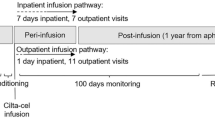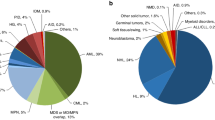Abstract
Background
Polyclonal anti-T cell antibodies (ATG or thymoglobulin®) are used as induction therapy in kidney transplant recipients. This study evaluates the safety, efficacy, and CD3+ T lymphocyte modulation of two ATG regimens.
Methods
The trial included two cohorts of kidney transplant recipients that were followed for one year. The study group, including standard immunological risk recipients, received one 3 mg/kg dose of ATG. The comparator group, including standard and high immunological risk kidney transplant recipients, received a fractionated dose regimen (up to four 1.5 mg/kg doses). Patient and graft outcomes and the kinetics of CD3+ T lymphocyte modulation in the peripheral blood were evaluated.
Results
One hundred kidney transplant recipients were included in each group. The one-year incidence of treated acute rejection, and patient and graft survival did not differ between groups. Bacterial infections were significantly more frequent in fractionated-dose group patients (66% versus 5%; P = 0.0001). At one-year follow-up, there was no difference in the incidence of cytomegalovirus infection (P = 0.152) or malignancies (P = 0.312). CD3+ T lymphocyte immunomodulation in the single-dose group was more effective in the first two days after transplantation. After the third post-transplant day, CD3+ T lymphocyte modulation was more efficient in the fractionated dose group.
Conclusion
Both regimens resulted in low rejection rates and equivalent survival. The single and reduced dose regimen protects from the occurrence of bacterial infections. CD3+ T lymphocyte modulation occurred with different kinetics, although it did not result in distinct outcomes.
Graphical abstract



Similar content being viewed by others
Data availability
Data is available upon reasonable request.
Abbreviations
- AKI:
-
Acute kidney injury
- AR:
-
Acute rejection
- ATG:
-
Polyclonal anti-T cell antibodies
- CD3+ TCL:
-
CD3+ T cell lymphocytes
- CIT:
-
Cold ischemia time
- CKD:
-
Chronic kidney disease
- CMV:
-
Cytomegalovirus
- CMV qPCR:
-
Cytomegalovirus quantitative polymerase chain reaction
- DGF:
-
Delayed graft function
- DSA:
-
Donor-specific antibodies
- ECD:
-
Expanded criteria donor
- eGFR:
-
Estimated glomerular filtration rate
- FD:
-
Fractionated dose
- HLA:
-
Human leukocyte antigens
- KDPI:
-
Kidney Donor Profile Index
- KDRI:
-
Kidney Donor Risk Index
- KT:
-
Kidney transplant
- KTR:
-
Kidney transplant recipient
- MFI:
-
Median fluorescence intensity
- MM:
-
Mismatch
- MPA:
-
Mycophenolic acid
- POD:
-
Postoperative day
- PRA:
-
Panel reactive antibodies
- SD:
-
Single dose
- TAC SL:
-
Tacrolimus serum level
References
Thiyagarajan UM, Ponnuswamy A, Bagul A (2013) Thymoglobulin and its use in renal transplantation: a review. Am J Nephrol 37(6):586–601. https://doi.org/10.1159/000351643
Machado FP, Vicari AR, Spuldaro F, de Castro JBS, Manfro RC (2018) Polyclonal anti T-lymphocyte antibody therapy monitoring in kidney transplant recipients: comparison of CD3+ T cell and total lymphocyte counts. Einstein São Paulo 16(4):eAO4278. https://doi.org/10.31744/einstein_journal/2018AO4278
Mourad G, Morelon E, Noël C, Glotz D, Lebranchu Y (2012) The role of thymoglobulin induction in kidney transplantation: an update. Clin Transpl 26(5):E450-464. https://doi.org/10.1111/ctr.12021
Moicean AD, Popp AM, Sinescu I (2009) Thymoglobulin–new approaches to optimal outcomes. J Med Life 2(3):319–324
Moura LRR et al (2011) Immunological induction with thymoglobulin: reduction in the number of doses in renal transplant from deceased donor. Einstein São Paulo 9(1):56–65. https://doi.org/10.1590/s1679-45082011ao1838
Dopazo C et al (2018) Low total dose of anti-human T-lymphocyte globulin (ATG) guarantees a good glomerular filtration rate after liver transplant in recipients with pretransplant renal dysfunction. Can J Gastroenterol Hepatol 2018:1–7. https://doi.org/10.1155/2018/1672621
Tedesco-Silva H et al (2015) Reduced incidence of cytomegalovirus infection in kidney transplant recipients receiving everolimus and reduced tacrolimus doses: reduced CMV infection with everolimus. Am J Transpl 15(10):2655–2664. https://doi.org/10.1111/ajt.13327
Levey AS et al (2009) A new equation to estimate glomerular filtration rate. Ann Intern Med 150(9):604. https://doi.org/10.7326/0003-4819-150-9-200905050-00006
Loupy A et al (2020) The banff 2019 kidney meeting report (I): updates on and clarification of criteria for T cell– and antibody-mediated rejection. Am J Transpl 20(9):2318–2331. https://doi.org/10.1111/ajt.15898
Peddi VR, Bryant M, Roy-Chaudhury P, Woodle ES, First MR (2002) Safety, efficacy, and cost analysis of thymoglobulin induction therapy with intermittent dosing based on CD3+ lymphocyte counts in kidney and kidney-pancreas transplant recipients. Transplantation 73(9):1514–1518
Gorrie M et al (1997) Dose titration during anti-thymocyte globulin therapy: monitoring by CD3 count or total lymphocyte count? Clin Lab Haematol 19(1):53–56
Wong W et al (2006) Comparison of two dosages of thymoglobulin used as a short-course for induction in kidney transplantation. Transpl Int 19(8):629–635. https://doi.org/10.1111/j.1432-2277.2006.00270.x
Kho MML, Bouvy AP, Cadogan M, Kraaijeveld R, Baan CC, Weimar W (2012) The effect of low and ultra-low dosages thymoglobulin on peripheral T, B and NK cells in kidney transplant recipients. Transpl Immunol 26(4):186–190. https://doi.org/10.1016/j.trim.2012.02.003
Abouna GM et al (1995) Randomized clinical trial of antithymocyte globulin induction in renal transplantation comparing a fixed daily dose with dose adjustment according to T cell monitoring. Transplantation 59(11):1564–1568
Buchler M et al (1996) Monitoring of ATG therapy by flow cytometry and lymphocyte counts in renal transplantation. Transpl Proc 28(5):2817–2818
Furlanetto G, Alegretti AP, Farias MG, Freitas PAC, Lara GM, Pedrazzani FS (2017) Cut-off value for absolute lymphocytes as an alternative for the immunophenotypic analysis of CD3+ T cells in the monitoring of immunosuppressive therapy with thymoglobulin. J Bras Nefrol. https://doi.org/10.5935/0101-2800.20170032
Ata P et al (2013) Monitoring of CD3+ T-Cell count in patients receiving antithymocyte globulin induction after cadaveric renal transplantation. Transpl Proc 45(3):929–931. https://doi.org/10.1016/j.transproceed.2013.02.092
Jackson R, Heyrend C, Fullerton C, Benefield E, Ensign R, Molina K (2020) Safety and efficacy of CD3 guided anti-thymocyte globulin dosing after pediatric heart transplant. J Heart Lung Transpl 39(4):S455. https://doi.org/10.1016/j.healun.2020.01.290
Linhares K et al (2021) The influence of the antithymocyte globulin dose on clinical outcomes of patients undergoing kidney retransplantation. PLoS ONE 16(5):e0251384. https://doi.org/10.1371/journal.pone.0251384
de Paula MI et al (2020) The influence of antithymocyte globulin dose on the incidence of CMV infection in high-risk kidney transplant recipients without pharmacological prophylaxis. Transplantation 104(10):2139–2147. https://doi.org/10.1097/TP.0000000000003124
Grafals M et al (2014) Immunophenotyping and efficacy of low dose ATG in non-sensitized kidney recipients undergoing early steroid withdrawal: a randomized pilot study. PLoS ONE 9(8):e104408. https://doi.org/10.1371/journal.pone.0104408
Sandes-Freitas TV et al (2021) Exploring the causes of the high incidence of delayed graft function after kidney transplantation in Brazil: a multicenter study. Transpl Int 34(6):1093–1104. https://doi.org/10.1111/tri.13865
Chen D (2014) Comparison of clinical outcome of low-dose and high-dose rabbit antithymocyte globulin induction therapy in renal transplantation: a single-center experience. Ann Transp 19:277–282. https://doi.org/10.12659/AOT.890069
Brennan DC, Daller JA, Lake KD, Cibrik D, Del Castillo D (2006) Rabbit antithymocyte globulin versus basiliximab in renal transplantation. N Engl J Med 355(19):1967–1977. https://doi.org/10.1056/NEJMoa060068
Clesca P et al (2007) Thymoglobulin and rate of infectious complications after transplantation. Transplant Proc 39(2):463–464. https://doi.org/10.1016/j.transproceed.2007.01.024
Paula MI et al (2021) Decreased incidence of acute rejection without increased incidence of cytomegalovirus (CMV) infection in kidney transplant recipients receiving rabbit anti-thymocyte globulin without CMV prophylaxis – a cohort single-center study. Transpl Int 34(2):339–352. https://doi.org/10.1111/tri.13800
Kuo H-T, Ye X, Sampaio MS, Reddy P, Bunnapradist S (2010) Cytomegalovirus serostatus pairing and deceased donor kidney transplant outcomes in adult recipients with antiviral prophylaxis. Transplantation 90(10):1091–1098. https://doi.org/10.1097/TP.0b013e3181f7c053
Doyle AM, Warburton KM, Goral S, Blumberg E, Grossman RA, Bloom RD (2006) 24-week oral ganciclovir prophylaxis in kidney recipients is associated with reduced symptomatic cytomegalovirus disease compared to a 12-week course. Transplantation 81(8):1106–1111. https://doi.org/10.1097/01.tp.0000204048.90367.97
Funding
None.
Author information
Authors and Affiliations
Contributions
MPF, RN, VRA, BCA, MCR were involved in research design, participated in data analysis, wrote, and revised of the manuscript, final approval to be published, and accountable for all aspects of the work.
Corresponding author
Ethics declarations
Conflict of interest
We have read and understood Journal of Nephrology's policy on disclosing conflicts of interest and declare that we have none.
Ethical approval
The ethics committee approved the study under registration CAAE ID: 38361620000005327. The study is registered in the Clinical trials registry (ClinicalTrials.gov—NCT04835948).
Human and animal rights
The study was carried out in accordance with the Declaration of Helsinki in human research.
Informed consent to participate
Not required.
Informed consent to publish
Data sharing anonymized data will be shared upon reasonable request to the corresponding author.
Additional information
Publisher's Note
Springer Nature remains neutral with regard to jurisdictional claims in published maps and institutional affiliations.
Supplementary Information
Below is the link to the electronic supplementary material.
Rights and permissions
Springer Nature or its licensor (e.g. a society or other partner) holds exclusive rights to this article under a publishing agreement with the author(s) or other rightsholder(s); author self-archiving of the accepted manuscript version of this article is solely governed by the terms of such publishing agreement and applicable law.
About this article
Cite this article
Machado, F.P., Rauber, N., Vicari, A.R. et al. Single-dose antithymocyte globulin in standard immunological risk kidney transplant recipients: efficacy and kinetics of peripheral blood CD3+ T lymphocyte modulation. J Nephrol (2023). https://doi.org/10.1007/s40620-023-01792-9
Received:
Accepted:
Published:
DOI: https://doi.org/10.1007/s40620-023-01792-9




